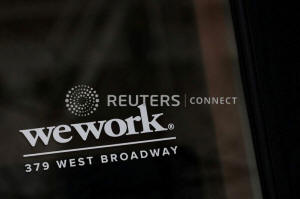Exclusive: WeWork considers dramatic valuation cut in IPO
 Send a link to a friend
Send a link to a friend
 [September 14, 2019] By
Joshua Franklin, Anirban Sen and Jessica DiNapoli [September 14, 2019] By
Joshua Franklin, Anirban Sen and Jessica DiNapoli
(Reuters) - WeWork owner The We Company may
seek a valuation in its upcoming initial public offering of between $10
billion and $12 billion, a dramatic discount to the $47 billion
valuation it achieved in January, people familiar with the matter said
on Friday.
Were the We Company to press on with the IPO at such a low valuation, it
would represent a major turning point in the venture capital industry's
growth over the last decade, which has led to the rise of startups such
as Uber Technologies Inc, Snap Inc and Airbnb Inc.
It would mean that the We Company would be at valued less than the $12.8
billion in equity it has raised since it was founded in 2010, according
to data provider Crunchbase. And it would be a blow to its biggest
backer, Japan's SoftBank Group Corp, at a time it is trying to amass
$108 billion from investors for its second Vision Fund.
The sources cautioned that no decision has been made and asked not to be
identified because the matter is confidential. WeWork and SoftBank did
not immediately respond to requests for comment.

The We Company is under pressure to proceed with the IPO, despite the
big valuation drop, to secure funding for its operations. It rents out
workspace to clients under short-term contracts, even though it pays
rent for them itself under long-term leases.
Investors have expressed concerns about the U.S. office-sharing
start-up's business model, which relies on a mix of long-term
liabilities and short-term revenue, raising questions about how it would
weather an economic downturn.
The We Company's deliberations indicate it does not feel confident that
the corporate governance changes it unveiled on Friday, slightly
loosening CEO and co-founder Adam Neumann's grip on the company, will be
enough to woo investors concerned about its lack of a path to
profitability.
The WeWork brand is strongly tied to Neumann, a flamboyant, freewheeling
40-year-old Israel-born entrepreneur who has said that the We Company's
mission is "to elevate the world's consciousness." His wife, Rebekah
Neumann, serves as the chief brand officer and is a powerful figure
inside the company.
The We Company's corporate governance changes are largely symbolic,
aimed at showing the We Company is listening to investors after being
forced to slash its IPO price expectations, corporate governance experts
said. Last month, it was considering an IPO valuation of around $20
billion.
"That change is seemingly cosmetic in nature," said Charles Elson, a
professor of corporate governance at the University of Delaware,
referring to the We Company's announcement it will reduce Neumann's
voting power. "He will still control the composition of the board."
The office space sharing startup said it was making the changes "in
response to market feedback." It said Neumann's superior voting shares
will decrease to 10 votes per share from 20, though he will retain
majority control of the company.
[to top of second column] |

The WeWork logo is displayed on the entrance of a co-working space
in New York City, New York U.S., January 8, 2019. REUTERS/Brendan
McDermid/File Photo

Neumann will also give the company any profit he receives from real estate deals
he has entered in to with We Company. He will also limit his ability to sell
shares in the second and third years after the IPO to no more than 10% of his
stock.
No member of Neumann's family will be on the company's board and any successor
will be selected by the board, scrapping a plan for his wife and co-founder,
Rebekah Neumann, to help pick the successor.
The We Company also disclosed it will list shares on the Nasdaq Stock Exchange.
It plans to complete the IPO this month, and its IPO investor roadshow could
launch as early as next week, Reuters has reported.
This is the second effort to repair damage done to the company's image among
investors. Earlier this month, it added a new member, Frances Frei, to its
all-male board and said Neumann would return a $5.9 million payment for use of
the trademarked word "We."
"For all the attention being given to 'governance reform' at the We Company,
entrenchment through unequal voting rights remains firmly in place," said Glenn
Davis, director of research at the Council of Institutional Investors.
TUSSLE WITH SOFTBANK
SoftBank chief Masayoshi Son has been pushing Neumann to delay the We Company's
IPO, but has so far failed to persuade him, Reuters has previously reported.
Were the We Company to delay its IPO, it would have to find debt financing to
replace a $6 billion loan package it clinched from banks last month. This debt
deal is contingent on the We Company raising at least $3 billion in its IPO.
Talks were ongoing on Friday between Neumann and Son about whether SoftBank
would participate in the We Company's IPO, with no decision yet taken, one of
the sources said. The Wall Street Journal reported earlier on Friday that
SoftBank was considering spending at least $750 million to buy shares in the
IPO.

The last time SoftBank invested in the We Company was in January at a $47
billion valuation, injecting $2 billion of cash in the New York-based startup.
(Reporting by Joshua Franklin in New York, Anirban Sen in Bangalore and Jessica
DiNapoli in Washington, D.C., Additional reporting by Herbert Lash in New York;
Editing by Nick Zieminski and Matthew Lewis)
[© 2019 Thomson Reuters. All rights
reserved.] Copyright 2019 Reuters. All rights reserved. This material may not be published,
broadcast, rewritten or redistributed.
Thompson Reuters is solely responsible for this content. |